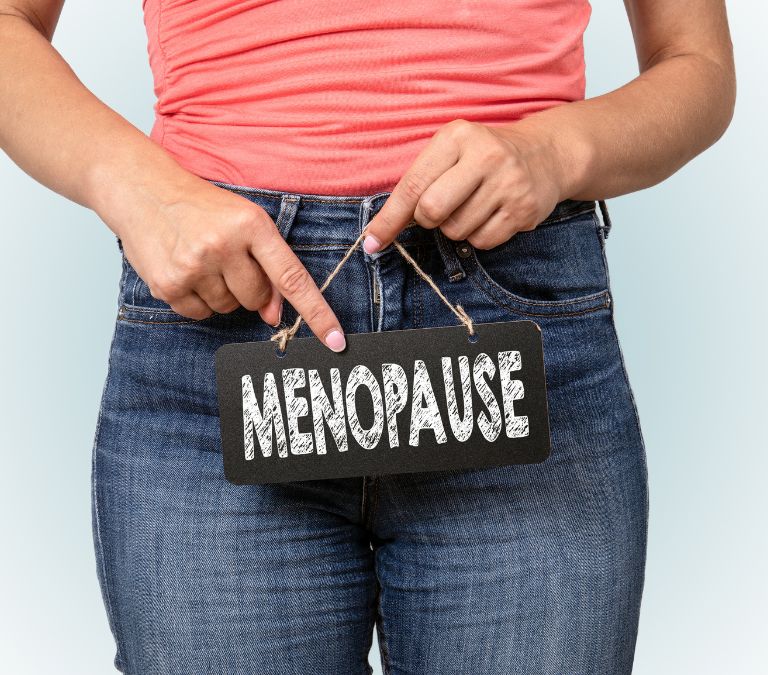Many women are at a loss as to what menopause is all about. They do not know what symptoms they may experience, and even if it is clear, they do not know how to handle them. The situation is even worse for their spouses, who are none the wiser.
Menopause is usually a challenging period for a woman, let alone her significant other, who is almost entirely clueless about how she feels except when she explains it to him. And even then, some menopausal symptoms and experiences are hard to describe which is why the menopausal period if not well managed can lead to disagreement between couples.
The somewhat complex and novel nature of menopause makes it an uphill task for spouses who sincerely want to support their ladies in this time of discomfort and vulnerability.
One primary reason for the difficulty experienced by spouses looking to lend a helping hand to their women undergoing menopause is the lack of knowledge about menopause and the inability of these spouses to find information about menopause that will enable them to know precisely how to be of help.
When their woman hits menopause, most men feel like it is something only women can relate to. Thus, they shy away from rendering any help as they deem themselves incapable of providing any solution to the situation.
Such behavior is not the right way to approach the situation. The period of menopause is when your couples need each other the most. This is the period your woman goes through a lot of physical, emotional, and biological changes during this period.
The impact of the vasomotor symptoms influences many of the things she does. For example, reducing the supply of certain vital hormones in a woman’s body during menopause can trigger various uncomfortable symptoms.
From mood swings that can even lead to depression to reduced libido due to vaginal dryness and pain, the woman has a lot on her plate that could cause her to act unlike her. The least you as her partner can do is to support her in whichever way you can to manage this natural condition and, as much as possible, mitigate the discomfort that comes with it.
We shall consider ways that you and your woman can effectively manage the symptoms and other experiences of menopause as a couple.
What is Menopause?

Menopause is a stage in a woman’s reproductive life primarily marked by the total stoppage of menstrual periods. Other significant features of this period include:
- Fluctuations in hormone levels
- The constant change in emotion leads to emotional and mental distress.
- Hot flashes.
- Many more uncomfortable symptoms.
Several unprecedented and strange changes characterize this period, and it can all get too much for the woman and her partner. As a result, you and your woman may find yourself at a loss about what to do and avoid for fear of worsening the situation.
It is challenging for men to understand some of the woman’s experiences. It is no fault of theirs, and the bodies of men and women work differently. However, it is no gainsaying that a man is likely to find menstruation a most unfathomable occurrence let alone menopause and the attendant symptoms.
Menopause is not simply about discontinuing the menstrual cycles; it is a condition that affects the woman drastically. Menopause brings about radical changes to a woman’s life. Therefore, you need to have it in mind when your woman hits menopause for you to render the right kind of assistance to her at such a hard time.
Dealing With Menopause As A Couple

You may be wondering how you can contribute to alleviating the pains and discomfort experienced by your woman at this critical period of her life and putting a smile on her face.
The first step towards achieving that goal is to know what menopause is all about and how the symptoms emanate. Next, it will help you understand how best to support your woman at this trying time.
Enlighten Yourself about Menopause
Information is crucial to understanding and managing menopause. Therefore, it is of utmost importance that you are abreast of the basics of menopause, such as what causes it, when to expect it, what changes to expect, and the common vasomotor symptoms.
It is essential that even the woman undergoing menopause, not just her partner, know these things and manage them, especially the symptoms. Some of the significant signs that characterize menopause include:
- Hot flashes and night sweats
- Dryness of the vagina
- Pain during sexual intercourse
- Loss of libido
- Insomnia and other difficulties with sleeping
- Dryness of the skin
- Bloating and increase in body weight
- Hair and bone thinning
- Emotional and mental distress can lead to depression.
- Shriveling of the breast
When you understand these symptoms, it will help you to appreciate better what your partner is going through. You will not be surprised or take offense when your woman starts exhibiting specific unusual characteristics such as mood swings and irritability.
As a woman is undergoing menopause, it is equally essential to have as much knowledge as possible to lay your hands on menopause, the symptoms named above, and how to manage it.
You will know how to deal with your vasomotor symptoms and explain how your partner feels so that they can help you overcome them.
Expect Random Changes in Mood

While mood swings are a significant symptom of menopause, not every woman experiences it. Some women anticipate with great joy the time when they will finally hit menopause.
Most women cannot wait to bid goodbye to the tiresome exercise of seeing and managing their menstrual periods. Menopause, for many women, is the beginning of a new phase of their lives that they are thrilled to begin.
When your woman hits menopause, do not immediately conclude that it will be a tale of woes. It does not also mean that the woman undergoing menopause may not witness specific mood changes, but you must not always attribute all mood changes to menopause.
Mood swings could be for several reasons apart from menopause. For this reason, you need to pay close attention to your woman’s attitude and ask gentle questions to decipher whether or not the change in her mood results from menopause or just stress from work or elsewhere.
Understand that these changes are not intentional and that your woman only responds to changes beyond her control. Ensure that you give them all the emotional support you can muster.
It is Time to Up Your Game
If you have been a reasonably good partner, this is the time to be even better. You are most likely the closest person your woman has at this point. Yes, it might prove to be an awkward and even tricky idea to discuss your menopause symptoms with your partner, but you must understand that that is the only way they can get to know what you’re going through and be able to support you.
You both probably have the house all to yourself as the children are in school or are married and left. It gives you ample opportunity, space, and time to build your relationship, as all you have then is one another.
As a partner to a menopausal woman, you need to be intentional about your relationship and support your spouse. You can ask questions and decide what your partner likes and what may set her off. The following questions will guide you in providing relevant support and care to your partner:
- How to talk about how you feel when emotions get hurt
- When your woman needs your assistance
- When the best help you can offer is to leave your woman alone
- These will show that you are interested in your woman’s well-being and are available whenever she needs your assistance.
Be in Constant Communication with Your Partner
Sharing thoughts and feelings is key to supporting your spouse at this time. You must put some effort into this even if you are not naturally good at talking.
You need not be unnecessarily talkative. Instead, talk about your daily experiences and feelings about the situation. As much as you may be scared to hurt the feelings of a loved one, it helps to let your spouse know what you think.
By sharing your thoughts and listening to your spouse, your woman will feel reassured that they are not alone in this situation. In addition, it would be best to show them that you can help at every step of the menopausal journey.
Patience is Key
It is of utmost importance that you trust your woman, be honest with her about how she is feeling, and do your best to be patient with her even when the going gets tough, which is most likely to do so.
While this is easy to say, it may prove hard to do, so you should prepare your mind for what lies ahead.
It helps to have the right mindset about menopause to muster the virtue of patience by understanding that menopause is not necessarily a problem that has beset you but a period of transition to a more robust and better relationship for the both of you.
Finding avenues of laughter and joy in this time of discomfort serves as a reminder to your woman that they are not alone on this journey and that her relationship can stand the test of time and become stronger and better. However, be careful not to be sarcastic or rude with your jokes or hearty comments.
Be the Better Person
Your woman is most likely to suffer mood swings and increased irritability due to the symptoms of menopause. Therefore, there is no reason to become worked up and show your unfavorable emotions.
Your partner is going through a rough patch for reasons beyond her control. Therefore, the right thing to do is to allow her to vent her emotions as much as she wants.
Rather than retaliate with vehemence and annoyance, you should calm down and listen to her. Then, reassure her of your continued support, watch how she will feel, and immediately act better.
If things go haywire and you do not feel like you can deal with it anymore, the prudent thing to do would be to communicate with her. Let your woman know what you think and show how you should withdraw from the situation for the time being for the sake of the sanity of you and your relationship.
A withdrawal from the scene will help you put your head in order and decide how best to follow the situation and preserve your relationship.
Be Vocal in Your Appreciation and Love
Maximize every opportunity to let your woman know you are there for her. Please do not assume that she already knows. Spoken words of affection, appreciation, and approval go a long way to reassure your spouse that you are there for her and that she is loved even in that uncomfortable situation.
Do not play the role of the silent supporter. Instead, be open; let her know how you feel about the situation. It will make the air more accessible and keep everyone at ease.
Little things like complimenting her beauty are all you need to do. Revisit those qualities that endeared you to one another. Unexpected gifts and little shows of affection will etch your love and support in her memory.
Let your partner know if you find it difficult to shower appreciation on her. After all, the thought is what counts, and she will understand this. You may also be good at expressing your emotions and love with time.
Help with Chores Around the House

Apart from the mere words of love, support, and affection, practical acts of assistance are significant to help your woman through this tough patch.
Helping with simple house chores and duties such as doing the dishes and laundry, cleaning the house, putting things away, and ensuring that everything is in order and the house smells nice are great ways to show support.
The uncomfortable symptoms of menopause may impede your woman from doing her share of the house chores.
Helping out with her share of the house chores will give her more time to rest, exercise, and do other things that are not so exerting as to worsen her condition.
Be proactive. Let your spouse know of any radical changes in the way things go in the house. For example, let her know if you expect visitors and have to dress up beforehand.
Talk with her about how you can help her manage some day-to-day challenges that she may face, such as meeting deadlines at work. Please do not wait until the situation overcomes her before you lend a helping hand.
Deal with the Sleep Issues
Your woman may be having problems with sleeping which may also affect you. First of all, you have to understand that it is no fault of hers. Insomnia and other sleep disorders are common symptoms among menopausal women.
Talk about how to manage the situation. You can discuss which approach is best to explore. You may decide to go with CPAP therapy. Depending on your collective decision, you may consult a medical practitioner for advice on which sleep hygiene methods to try out.
If you, and not your woman, are the one who has a sleep issue, or you both have different sleep issues, you may want to sleep in other places.
If you snore while sleeping, sleeping in the same room with your woman who has insomnia will mean no sleep for her at all. Rest, especially night rest, is crucial for a relaxed mood and can even help relieve specific menopausal symptoms like anxiety and mood swings.
Be Intentional About Your Partner’s Health

If you can ensure that your spouse is in tip-top shape health-wise, you will have been able to overcome most of the uncomfortable symptoms of menopause.
A healthy spouse is most likely to be in high spirits and has high self-esteem.
Exercising is one great way of keeping fit and healthy. You can encourage your woman to start and maintain an exercise routine by doing it with her.
You need not go all out with heavy workout routines. Tiny exercise plans such as regular walks and cycling can do wonders for your health and your partner.
In the same way, you can join your woman in her dieting routine to ensure that she is consistent in letting off that extra weight and bloating that comes with menopause.
If you do not need to diet, you can participate by eating the same food together and then eating whatever you want afterward. For example, you can join your spouse in eating a low-calorie breakfast, after which you can eat something extra to make up for your calorie needs.
Dealing with Sexual Health Issues

Sexual intercourse can be pretty uncomfortable for menopausal women. Vaginal dryness can lead to painful sexual intercourse, reducing your woman’s sexual drive.
You may find yourself in a frustrating situation where you want a lot of sexual activity, but your woman’s libido is low, or she is not interested in sex.
The solution is to balance sex and intimacy and channel your interest and energy towards being physically close to your woman. Do not focus on sex alone.
Find out what feels good to her and do those things with your loved one. Tiny things like a body massage, yoga meditation, games, or just cuddling together on the bed or sofa can prove satisfying for both of you.
Changes in how the woman’s vagina works during menopause can bring discomfort and unpleasant sexual experiences. It is advisable to visit a gynecologist with your woman to talk about medical remedies to help manage the effects of these changes on your sexual life. The gynecologist may recommend treatments such as estrogen cream to satisfy your woman in dealing with these issues.
You may also consider consulting a sex therapist if your woman suffers from very low libido, especially if you have a very high sex drive. The therapist will advise you on how best to go about the situation and find a solution that works for everyone.
Conclusion
The amount of support required during menopause differs from woman to woman. Unfortunately, there is no hard and fast rule on dealing with menopause as a couple.
The primary things to have in mind as a partner assisting their woman at this critical time are:
Attentiveness
Get information about the condition at your fingertips by asking questions.
Collaboration to manage the situation.
If you experience any challenges, be sure to get professional help. A therapist who is good at relationship counseling will put you through the steps to preserve your relationship and make it better to work together to deal with menopause.
The uncomfortable nature of menopause is not only suffered by the woman, and their spouses also bear the brunt. For example, your relationship can suffer when your woman undergoes specific menopausal symptoms such as hot flashes, night sweats, mood swings, and low libido.
These symptoms can be so severe that they can disrupt the woman’s and her partner’s sleeping pattern. In addition, symptoms like lack of libido due to painful sex or vaginal dryness can affect the sexual lives of couples.
While you may not be medically qualified to help ease the symptoms such as hot flashes and mood swings, you can assist your woman in other efforts to control the condition. For example, you can overcome the challenges that characterize this period by helping your spouse during her yoga exercises or preparing calming delicacies.
Remember that menopause and the symptoms that come with it are not permanent. Instead, they will wane in severity and frequency as your woman grows older.









